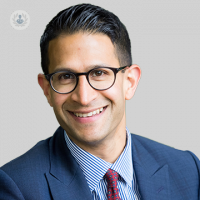Everything you need to know about tremor
Written in association with:Tremor is a very common condition, that affects 1 in 5 people over the age of 65. In this informative new article, leading London-based neurologist Dr Tabish Saifee gives us his expert insight into tremor.

What is tremor?
Tremor is the rhythmic and oscillatory movement of a body part. It commonly affects the hands but some tremors can affect other body parts such as the face, voice, head or legs. There are other types of bodily involuntary movement, and tremor needs to be distinguished from these.
What are the main symptoms?
The main symptoms are noticing that a body part is shaking. This can be when you are at rest, with all muscles relaxed or in action. An example of this is a postural tremor, which comes on when the affected body part is held up against gravity. Kinetic tremor arises on movement of the affected body part.
If I think I have tremor, when should I seek medical assistance?
If you have a tremor, it is worth seeking medical attention if it came on suddenly, if it is present when resting the body part, or if it is interfering with day-to-day tasks.

How is it diagnosed?
Many tremors are diagnosed clinically. This involves a detailed clinical assessment i.e., listening to your story in detail, asking specific targeted and relevant questions, undertaking a neurological examination such as testing the arms and legs in the clinic, assessing your gait and assessing the tremor itself. The doctor will also take into account which body parts the tremor affects, the symmetry of the tremor, the frequency of oscillation of the tremor, the amplitude of the movement and the presence of any other abnormal movements or other medical signs on examination. Sometimes, but not always, further tests might be needed such as special blood tests or specialist scans to help arrive at a diagnosis.
Can it be potentially dangerous or life-threatening?
It is not likely that a tremor is dangerous or life-threatening but there are a wide range of conditions where tremor can be seen. These can include fairly benign conditions or isolated tremor syndromes, side effects of medications, some genetic conditions as well as conditions that are neurodegenerative and would be expected to gradually progress. There are treatments available for most types of tremor, with the treatment depending on the type of tremor.
Dr Tabish Saifee is a leading neurologist, based in London. If you would like to book a consultation with Dr Saifee, you can do so via his Top Doctors profile.


